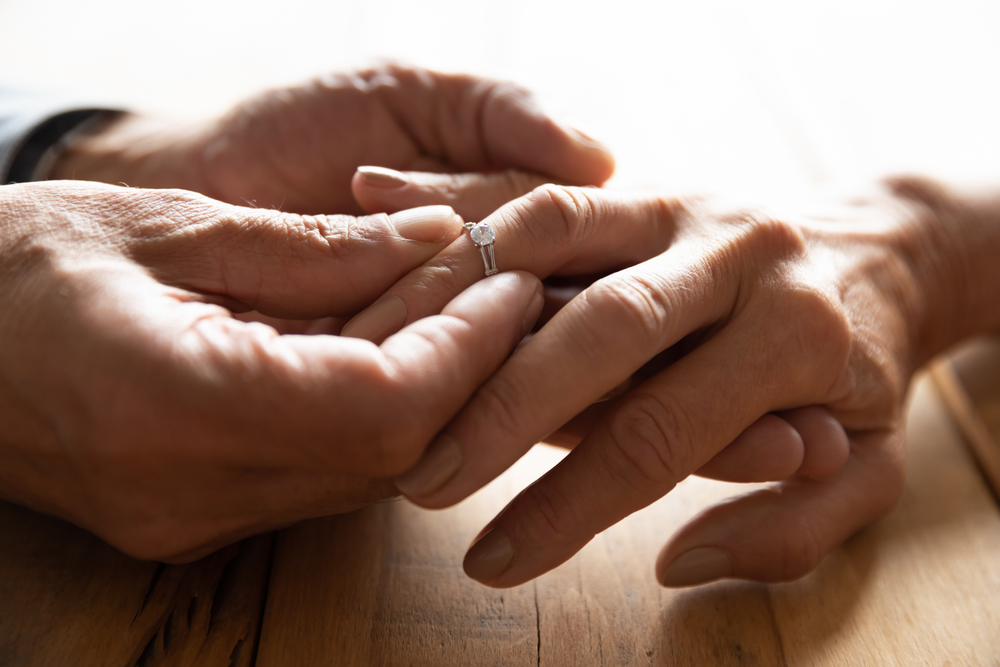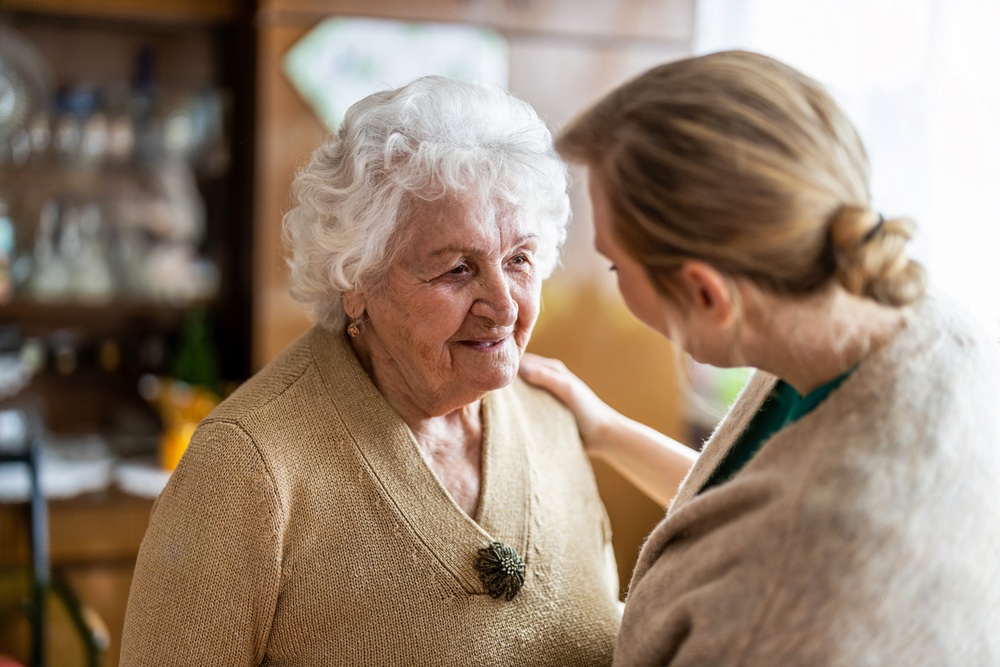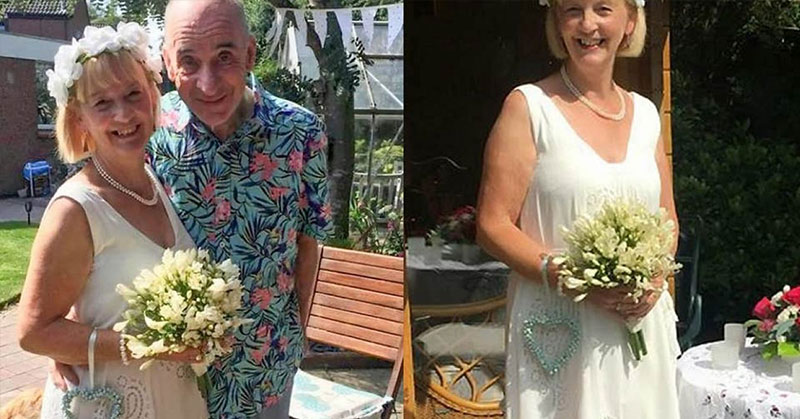When a loved one develops Dementia, it can be extremely difficult both for the sufferer and for his or her friends and family. Taking care of someone who is losing their cognitive abilities is physically exhausting, and can be emotionally challenging as they slowly lose the person they once knew. While you’re taking care of someone affected by Dementia, it is important to find joy and connection with them wherever you can. For one couple, this came in the form of getting married… again.
An Unexpected Proposal

71-year-old Bill Duncan and his wife, 69-year-old Anne, have been together for eighteen years and got married in 2007. Bill was diagnosed with Dementia in 2010, and Anne has been taking care of him ever since. As his neurodegenerative disease has progressed, Bill has forgotten many moments in his life, including the couple’s wedding day.
While the pair were attending a family member’s wedding earlier in the month, Bill was moved by the ceremony and told Anne, who he thought was his girlfriend, that he wanted to get married. At first, Anne thought it was just a brief moment of memory loss.
“He asked me when would we be walking up the aisle together, and I thought he would just forget he’d asked me that, but then the next day he said it again,” she explained [1].
Read More: How These Greek Islanders May be Avoiding Dementia
Married – Again

https://www.shutterstock.com/image-photo/close-view-old-60s-man-put-1667342788
Bill was insistent that they get married, so a few weeks later the couple tied the knot for the second time in their garden, surrounded by family and friends. They had a cake, and decorations, and Anne even wore a white wedding dress for the occasion.
“We renewed our vows surrounded by a small group of our friends and family, and even added some bits in for Bill so it felt like he really was getting married,” said Anne. “It was the most beautiful day, and being with our friends in the garden we share together made it all the more perfect.” [1]
What is Dementia Exactly?

Dementia is not a disease in and of itself, but rather a collection of symptoms that are caused by disorders of the brain, such as Alzheimer’s, vascular dementia due to strokes, Lewy Body disease, head trauma, Parkinson’s, or Huntington’s disease [2].
Dementia is progressive, so as more brain cells become damaged and eventually die, symptoms will gradually worsen [2]. Dementia affects your memory, as well as your thinking and social abilities. This could include language skills, visual perception, problem-solving, self-management, and the ability to focus and pay attention [3,4]. For some, Dementia can affect their ability to control their emotions, which can cause their personalities to change as their condition worsens [4].
Dementia in the United States

Currently, one in three seniors in the United States dies with Alzheimer’s or another type of Dementia, making it the sixth leading cause of death in the country [5].
There are approximately sixteen million Americans who are providing unpaid care for a person with Dementia, and these numbers are increasing as our population ages. Since the year 2000, the number of deaths from Alzheimer’s has increased by nearly 150 percent, and fifty percent of primary care physicians in the US do not believe that the healthcare system is prepared for this continued growth [5].
How to Help Someone with Dementia

Caring for someone with Dementia can be overwhelming, exhausting, and lonely. It is important that during the early stages of the condition, you think about how it will progress and plan for the future. This could include getting your loved one’s wishes down on paper while they are still mentally capable of doing so so that you have something to refer to when important decisions are being made on their behalf when the disease is in its more advanced stages.
You will also have to decide who is going to be their primary caregiver and how their needs will be met, as well as where he or she will live. If you think a care facility may be the best option, it is important to start considering your options early, as there are often waiting lists for many long-term care homes. If you are the primary caregiver, it is important not to forget about yourself and your needs in the process of looking after someone else. Don’t forget to ask for help, use the resources that are available to you, and put a personal support plan in place for when you are overwhelmed [6].
Read More: Expert Encourages People to Take This Vitamin to Reduce Dementia Risk
It is also helpful to develop day-to-day routines that provide structure and familiarity to your loved one.

This will help ease any anxiety they may be feeling, and make it easier for them to actively participate in daily routines. Social activities and visitors can be a valuable part of a person with Dementia’s day. It is important that you plan activities and guests at times of day when your loved one is best able to handle them and to plan activities that revolve around his or her interests.
Planning activities can provide you with the opportunity to connect with your loved one and make memories with them, and guests can give you a chance for a break from providing care [6]. Relationships and social environment are central to people’s lives, and that includes someone with Dementia. For that reason, it is incredibly important that friends, family, and caregivers make sure their loved one feels valued and included, and that they focus on supporting their wellbeing [7].
Enjoying “Newlywed” Life

According to Anne, Bill has been happy and affectionate ever since the pair’s nuptials. “Since his diagnosis, his displays of affection have become scarce, so to have all of this love radiating from him towards me has been truly wonderful,” she said [1].
Their “wedding day” was very emotional, and Anne feels blessed that even after years of battling Dementia, she still has a husband who continues to love her. “Bill is a wonderful man and has always brought joy to other people’s lives throughout his career as an entertainer, and he’ll never stop bringing joy to mine,” she added [1].
Read More: Blood Pressure Variability Linked to Increased Dementia Risk
Sources
- https://www.independent.co.uk/life-style/dating/couple-second-wedding-dementia-bill-anne-duncan-a9074541.html
- https://alzheimer.ca/en/Home/About-dementia/What-is-dementia
- https://www.mayoclinic.org/diseases-conditions/dementia/symptoms-causes/syc-20352013
- https://www.nia.nih.gov/health/what-dementia-symptoms-types-and-diagnosis
- https://www.alz.org/media/Documents/alzheimers-facts-and-figures-infographic.pdf
- https://www.helpguide.org/articles/alzheimers-dementia-aging/tips-for-alzheimers-caregivers.htm
- https://www.alzheimers.org.uk/get-support/help-dementia-care/understanding-supporting-person-dementia

